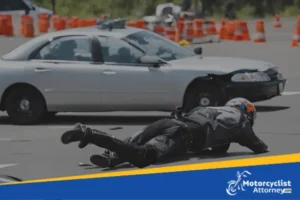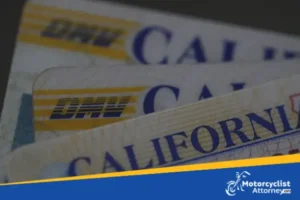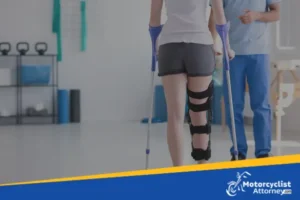
Traumatic Brain Injuries (TBI) can happen to anyone who had been in a motorcycle accident or other high-impact motor vehicle crashes. The Centers for Disease Control describes a TBI as caused by a bump, blow, jolt to the head, or a penetrating head injury that disrupts the normal function of the brain.
The Department of Rehabilitation of California estimated that a TBI happens to 1.7 million Americans a year, resulting in 53,000 deaths, 235,000 hospital trips, and 1.1 million emergency department visits A TBI can affect the way a person acts, thinks, or feels depending on the cause, location, and severity of the incident.
The common causes of a TBI include car accidents, falls, assault, and sports injuries which are classified as mild (concussion), moderate, or severe. Based on the patient’s clinical presentation, the effects can be classified as either temporary or permanent. Those who survive a TBI can experience effects of mild injuries that last a few days while others suffer from severe trauma for the rest of their lives. TBI can result in impairments related to thinking or memory, movement, sensation, or emotional functioning.
Different Types of TBI From Motorcycle Accidents
There are several factors that determine if there are severe head injuries as there are different types of traumatic brain injuries related to motorcycle accidents. The following are:
Mild concussion (mTBI)
Three out of four TBIs are concussions. Concussions are tricky. Despite the visible cut or bruise in the head, a concussion is not something that is easily seen or identified. Even when days or weeks have already passed since an accident, the signs of a TBI might not appear. MTBIs can include brief alterations of consciousness, like feeling “dazed” or loss of consciousness episodes that last less than 30 minutes.
Moderate TBI
Loss of consciousness might occur for over 30 minutes but it is expected not to last for a day. On the other hand, confusion can last for up to one week.
Severe TBI
Individuals with this type of head injury lose consciousness for over one full day. These injuries are typically associated with changes seen via head CT or brain MRI.
Computed tomography, or a CT scan, is a diagnostic imaging procedure that uses a combination of X-rays and computer technology to produce images of the inside of the body, determining injury patterns. Meanwhile, a brain MRI (magnetic resonance imaging) scan is a painless procedure that produces very clear images of the structures inside of the brain. MRI uses a large magnet, radio waves, and a computer to produce detailed images.
Uncomplicated TBI
Head CT/brain MRI results appear normal, regardless of mild, moderate, or severe grade.
Complicated TBI
Head CT or brain MRI shows changes, like bleeding. Most, if not all, complicated TBI cases require intensive care unit admission.
Closed
A closed TBI refers to an injury from an outside force that caused a blow or jolt to the head and did not penetrate the skull. Intracranial injury hurts the brain from within, leading to subdural hematoma and other types of inflammations that can lead to permanent damage or brain death.
Open
Healthcare providers may call open TBI a penetrating TBI. A penetrating TBI occurs when a bullet, knife, or any object goes through the skull. If it goes into the brain, it directly damages brain tissue.
Nontraumatic
Also known as a hypoxic/anoxic brain injury. Some TBIs aren’t from trauma. They can result from strokes, seizures, and events like choking and near-fatal drownings. These incidents can deprive the brain of oxygen (cerebral hypoxia) and lead to severe brain injury.
How a TBI Can Occur From a Motorcycle Accident
Some traumatic brain injuries related to motorcycle accidents will have victims appearing normal, without displaying any apparent signs of a brain injury. To protect the head from acquiring a TBI if ever a person gets involved in a motorcycle accident, one must wear a helmet.
With that being said, all motorcycle riders must be knowledgeable of what helmets to buy for safety and other precautions. According to the NHTSA, helmeted motorcyclists are significantly less likely to experience facial and head injuries, as well as traumatic brain injury, when compared with non-helmeted riders in the event of an accident.
Human brains are susceptible to damage from the force generated by a typical motor vehicle accident. Needless to say, not wearing a helmet leaves the head unprotected and increases the risk of death. Because the head has no barrier, the brain is vulnerable to traumatic brain injuries related to motorcycle accidents.
TBIs are the primary cause of motorcycle fatalities. These typically happen when a rider gets ejected from the motorcycle and hits his/her head on the pavement, causing internal bleeding and damage to other parts of the body. It cannot be stressed enough that wearing motorcycle helmets and following helmet use laws are a way to avoid head trauma, permanent disability, or even fatal injuries.
Symptoms of a TBI After a Motorcycle Crash
Some signs of a TBI may appear right after motorcycle crashes while others can manifest days or even weeks after emergency medical care is given.
For a mild traumatic injury related to motorcycle accidents, the signs and symptoms may include:
- Headache
- Nausea or vomiting
- Fatigue or drowsiness
- Speech problems
- Dizziness or loss of balance
- Sensory symptoms
- Sensory problems, such as blurred vision, ringing in the ears, a bad taste in the mouth or changes in the ability to smell
- Sensitivity to light or sound
- Cognitive, behavioral or mental symptoms
- Loss of consciousness for a few seconds to a few minutes
- No loss of consciousness, but a state of being dazed, confused or disoriented
- Memory or concentration problems
- Mood changes or mood swings
- Feeling depressed or anxious
- Difficulty sleeping
- Sleeping more than usual
For moderate to severe injuries, the signs can include:
- Loss of consciousness from several minutes to hours
- Persistent headache or headache that worsens
- Repeated vomiting or nausea
- Convulsions or seizures
- Dilation of one or both pupils of the eyes
- Clear fluids draining from the nose or ears
- Inability to awaken from sleep
- Weakness or numbness in fingers and toes
- Loss of coordination
- Cognitive or mental symptoms
- Profound confusion
- Agitation, combativeness or other unusual behavior
- Slurred speech
- Coma, brain death, and other disorders of consciousness
To avoid being involved in a motorcycle accident that will cause a TBI, stay safe and ride safe — practice defensive riding and adhere to helmet use laws by always wearing a helmet and protective gear. The risk of head injury is much higher without protection. You owe it to yourself to shield your body from pain.
Long-Term Effects of Traumatic Brain Injuries Related to Motorcycle Accidents
The effects of a TBI on riders caused by motor vehicle crashes may be life-long or life-threatening. Examples of disabilities, injury patterns, and motor deficits caused by moderate to severe head injuries include:
- Paralysis
- Spasticity (muscle stiffness) or uncontrolled movements
- Problems walking, talking, or swallowing
- Difficulty carrying or moving objects
- Vision problems
- Loss of fine motor skills, such as buttoning a shirt
- Inability to recognize something based on touch
- Difficulty thinking and remembering
- Difficulty with social relationships
- Difficulty making and keeping personal and professional relationships
- Difficulty being part of social activities
- Difficulty taking part in recreational or leisure activities
- The decreased ability or inability to keep a job or go to school
Motorcyclist Attorney Will Fight For You
After being involved in a motorcycle accident, insurance companies might give you lowball offers that do not even measure up to the injuries that you sustained and damage to property. You need competent counsel who is an expert in handling motorcycle accident cases in California. If the incident led to motorcycle fatalities, all the more should you have a personal injury lawyer by your side to pursue legal action on your behalf.
Motorcyclist Attorney will help you file a lawsuit and hold the negligent party and their insurance financially responsible for your pain and losses.
We are your ally in times like these. Our motorcycle accident attorneys have years of experience handling lawsuits for motorcycle accident victims in California and beyond. We have recovered millions of dollars for our clients. We can do the same for you.
Our goal is to get you a fair settlement for your personal property damages and injuries. Not only will you be well-compensated, but the team will assure that you get the proper medical treatment for your injuries from motorcycle accidents without spending a dime. We will give you an advance on hospitalization costs and take care of securing your medical record so you can focus on your recovery. Contact our motorcycle accident attorneys now or call (844) 8242955 for a free consultation. We work on a contingency fee basis — no fees unless we win. We speak English and Spanish.




